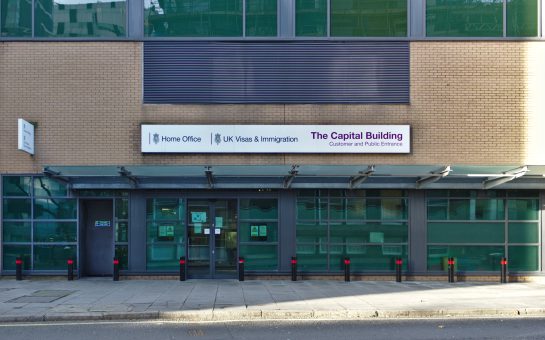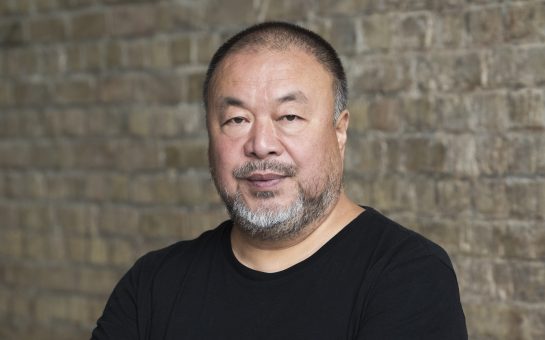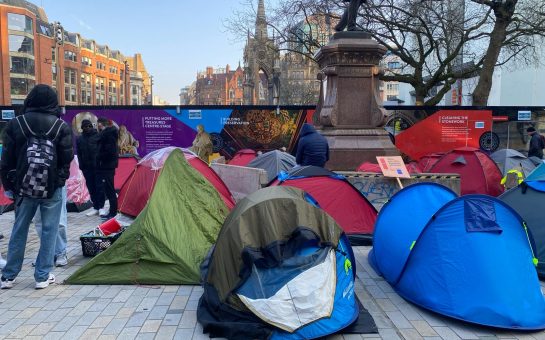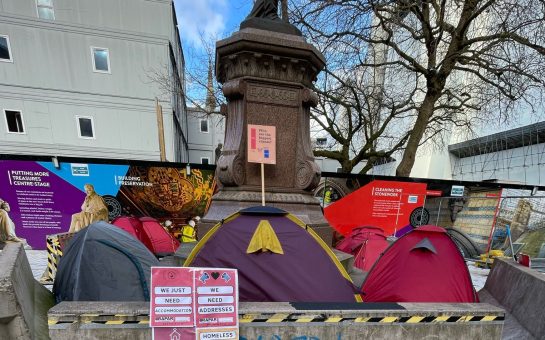It is 20 years since political activist Yagoub Matar, 49, first became a refugee when escaping the clutches of the one-party, oppressive state of Sudan.
He first sought refuge in Egypt in 1998, but now lives in Bolton with his wife and three children.
He became a political refugee when his stance on refugees and criticism of the government made his eighteen-year stay in Egypt untenable.
In September 2017, he become one of only 121,837 refugees living in the UK by the end of that year – just 0.25% of the UK’s total population – when he arrived in Greater Manchester.
He accessed the UK through the Gateway Programme after seeking refuge and has since had a mixed experience of life as a refugee in the area.
He achieved refugee status because he could prove that he was at risk by continuing to live in Egypt and his application was granted by the government.
He is not the stereotype of a refugee typically portrayed in the media.
This is a refugee who has attempted to immerse himself in the local culture and adapt to the demands and conformities of both local and national culture.
On his arrival in Bolton he said: “The biggest challenge I faced was the language barrier.
“I speak English but not colloquial English and the area which I live in makes it harder because I cannot understand anything people say.
“With the help of Refugee Action I started at the community college studying English language.
“For the colloquial language, I participated in volunteer work in the community that covered both local people and immigrants.”
However, unable to find a job, he must accept that volunteering is the only way into a career for a refugee.
He continued: “In order to work in the UK you must have UK experience which I obviously don’t have.
“To get this you have to volunteer.
“I tried to apply with my own qualifications for different jobs but unfortunately none of employers even called me for an interview.”
He has applied for numerous jobs in administration, social work and accountancy but companies will not even look at him because of his lack of work experience in the UK.
He must build up a bank of one year’s volunteering to even be considered.
How can he forge a life for him and his family without an income?
He says the system must change: “Many people from aboard have their own skills, and very good skills.
“To be an electrician or a builder you have to have a licence and also study in this country.
“This means that these skills [gained abroad] are not transferable to a job in the UK.
“Why can’t the government have exceptions to help refugees?
“The system is failing.
“Good mechanics aged 52 and 53 have good skills but have to learn English and go through apprenticeships.
“It is so difficult for them to do this, but intensive English courses would help.
“People who come to the area are registered at Bolton College to learn English as a second language and they select two hours a day and two days a week, but it is not enough.”
He believes that the key to integration is to understand the differences and nuances in cultures and communicate openly with the local people.
He has made a conscious effort to make himself known to the local community and approach them to try and navigate some of the usual barriers that stand between immigrants and the local population.
However, it is when he has attempted to forge more meaningful relationships that he has struggled to bridge the cultural divide.
He said: “Here, the way people socialise is different.
“I had to force some neighbours to communicate and I had to fabricate a topic to initiate conversation with them.
“I succeeded to some extent to have a good relationship with my neighbours.”
In order to integrate more and for the local people to open up more with refugees and create a more welcoming and inclusive environment, Yagoub believes that there is work to be done on both sides to bridge the cultural differences.
He is taking the time to understand and adapt to British culture and he suggests that this is the reason why he has been welcomed without friction.
“We have to understand the culture of the local area.
“I haven’t experienced any problems because I have taken the time to learn about the cultural differences.
“If I can come closer to your culture, I can make a peaceful accord between you and explain my culture to you.
“For example, in Sudan there can be a queue for a bus and I can cut in with no consideration for others.
“Here, you cannot do that.
“Me and my wife try to go into the community and learn about the culture and the laws and this would be good for other newcomers to the area.
“Sometimes though I don’t know the differences.
“I remember the first time I took the bus with a pushchair for my kids and left it in the aisle.
“In my culture no one cares.
“I could tell from people’s eye contact and facial expressions that something was wrong and I asked ‘am I doing something wrong?’
“They told me that I cannot leave it there so I had to fold it up and take my kids elsewhere.
“Their facial expressions can come across as aggressive.
“But it is just about taking a bus in different cultures.
“My initial reaction from the facial expressions was that there was hatred and they don’t like me but when I asked, I began to understand the culture of the country.”
He also believes that it is up to media to inform and educate British people more on the situation of refugees and to improve their knowledge on why they are moving to their country.
He said: “It is normal for any nation, if they don’t any information about migrants, to be nervous.
“They are asking: why are they coming here?
“They may have the wrong impressions.
“In one year here I have watched media a lot and they don’t shed a light on the people who come here.
“I think the media can play a vital role in providing information on refugees and why they have left their countries and they are not, because they live in local areas.
“There is no discussion of their situations at all.
“There needs to be a two-way dialogue because people coming here don’t know what British values are.
“There needs to be a system so that refugees can understand what British values are and adapt to them.”
Refugee Action, a charity that has worked with Yagoub and has helped him settle and also provided a platform for him to help refugees in the future, also believes that there is a lot of work to be done to provide support for refugees when they arrive in the UK.
Jeremy Bernhaut, Specialist Resettlement Manager at Refugee Action said: “Most of the British public want our country to be a welcoming home for those who need sanctuary and a good number of local authorities are committed to making that happen.
“Still, some issues do remain like a lack of funding for services, the poor quality of asylum accommodation, a shortage of English lessons, and restrictive legislation which prevent those who are seeking asylum from getting into work.
“Through our own work and by public campaigning we hope to continually improve the support given in this country to refugees and people seeking asylum.”
The lack of services for refugees is the most significant factor holding back their integration, according to Curzon Ashton FC community manager Andy Cheshire.
He runs an inclusive football session to bring refugees and locals together and provide respite from the struggles of daily life.
They receive refreshments, free kit and also free season tickets to home games at the club.
Andy said: “There are no services for refugees in the area. There are no social activities for them. There is nothing in the form of recreational activities.
“We are an inclusive club and want to reach out to, and engage with, our local community.”
It is clear that was it needed is action from both the refugees and service providers in this country.
The provision of education needs to improve.
Yagoub is an example of how education accessibility for refugees needs to improve.
He plans to reapply for a master’s degree in migration and diaspora studies at SOAS University of London, after been rejected this year for failing to obtain a scholarship to raise the money for a pre-course.
He is not being provided with the necessary support to improve his situation and contribute to the British economy.
He is willing to move away from his children in order to provide a better life for them, contribute to the economy and help refugees like himself by studying on this course.
More needs to be done to provide the required funds and accessibility so that refugees can integrate into society better and improve their prospects.



